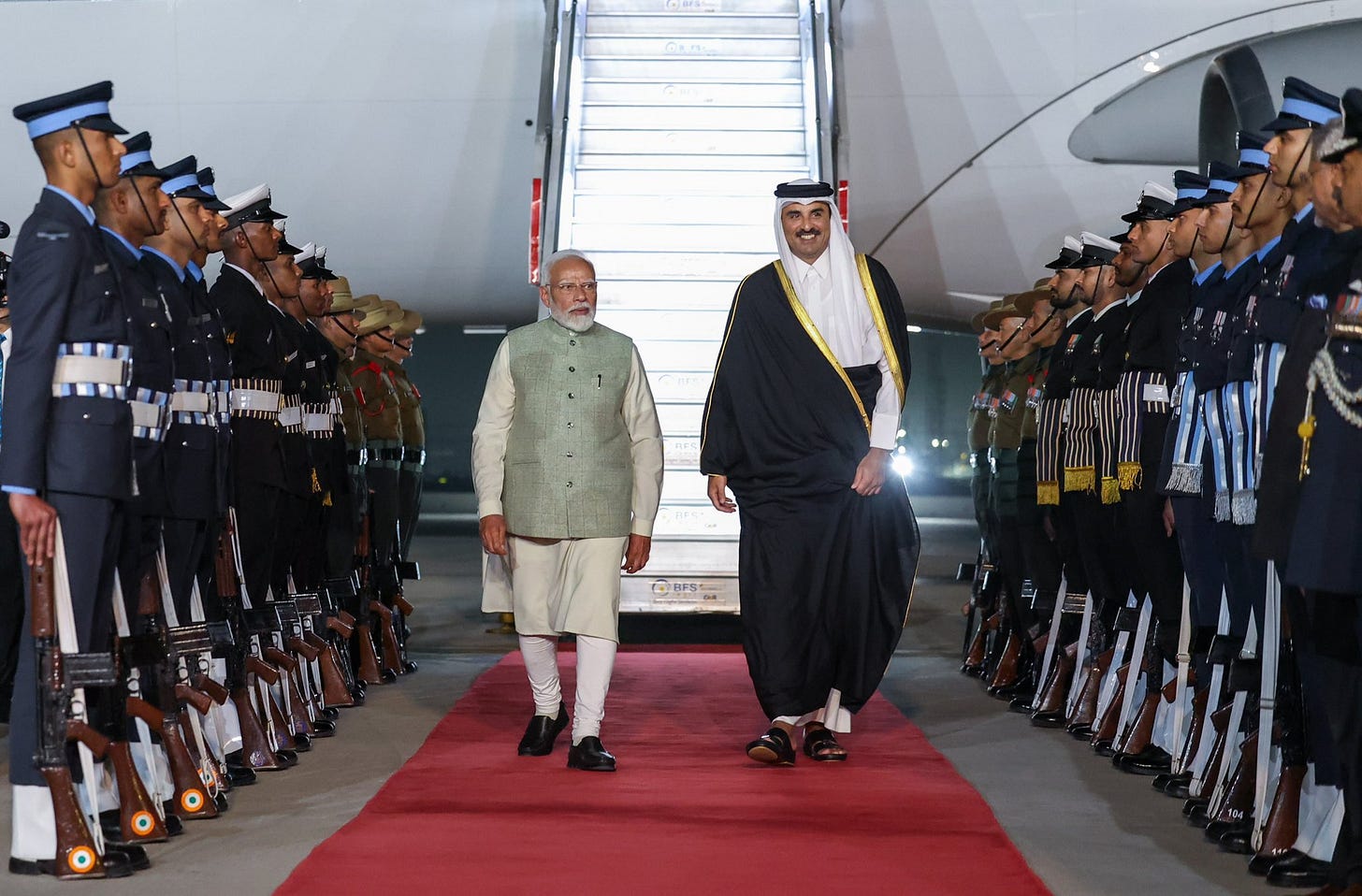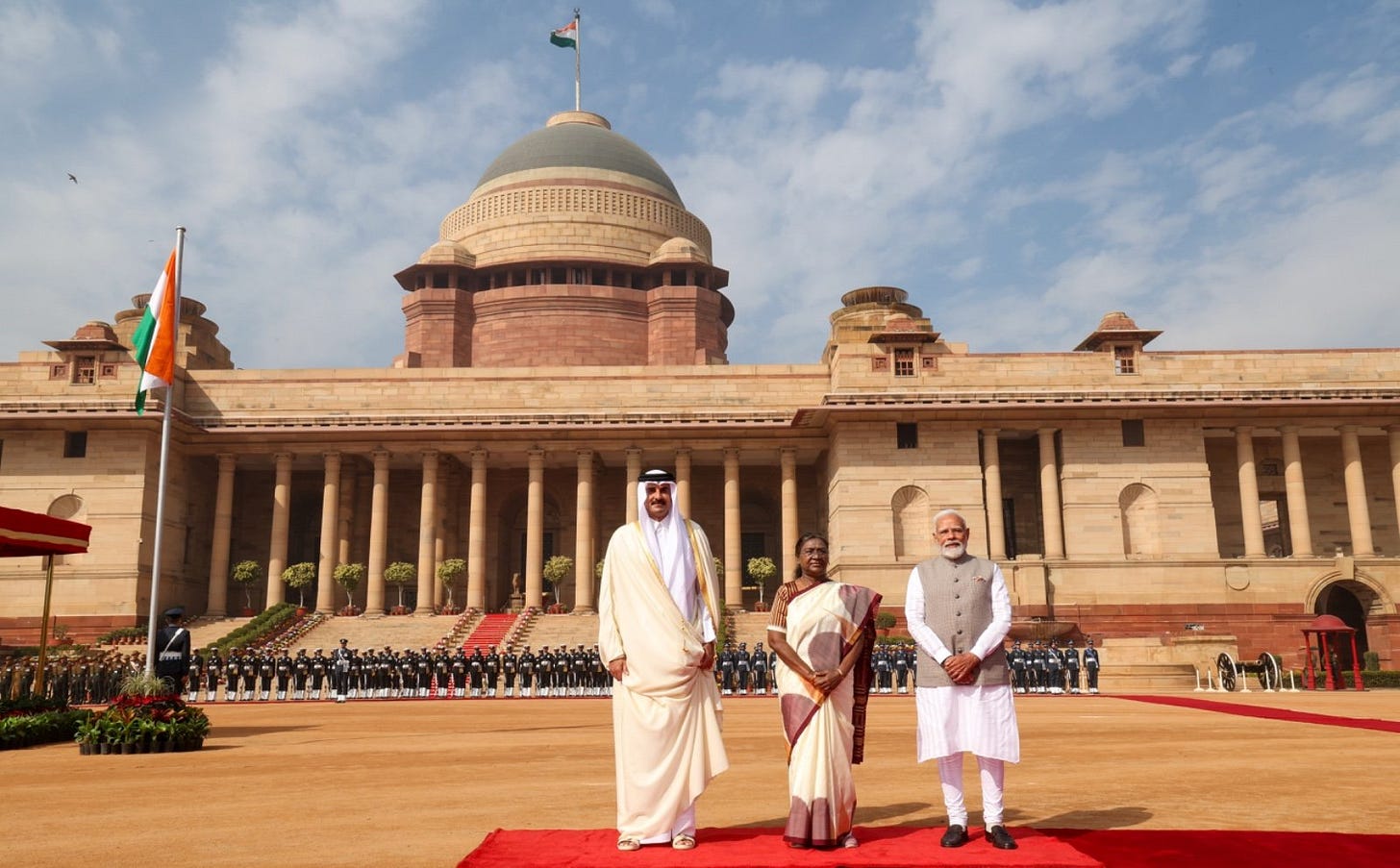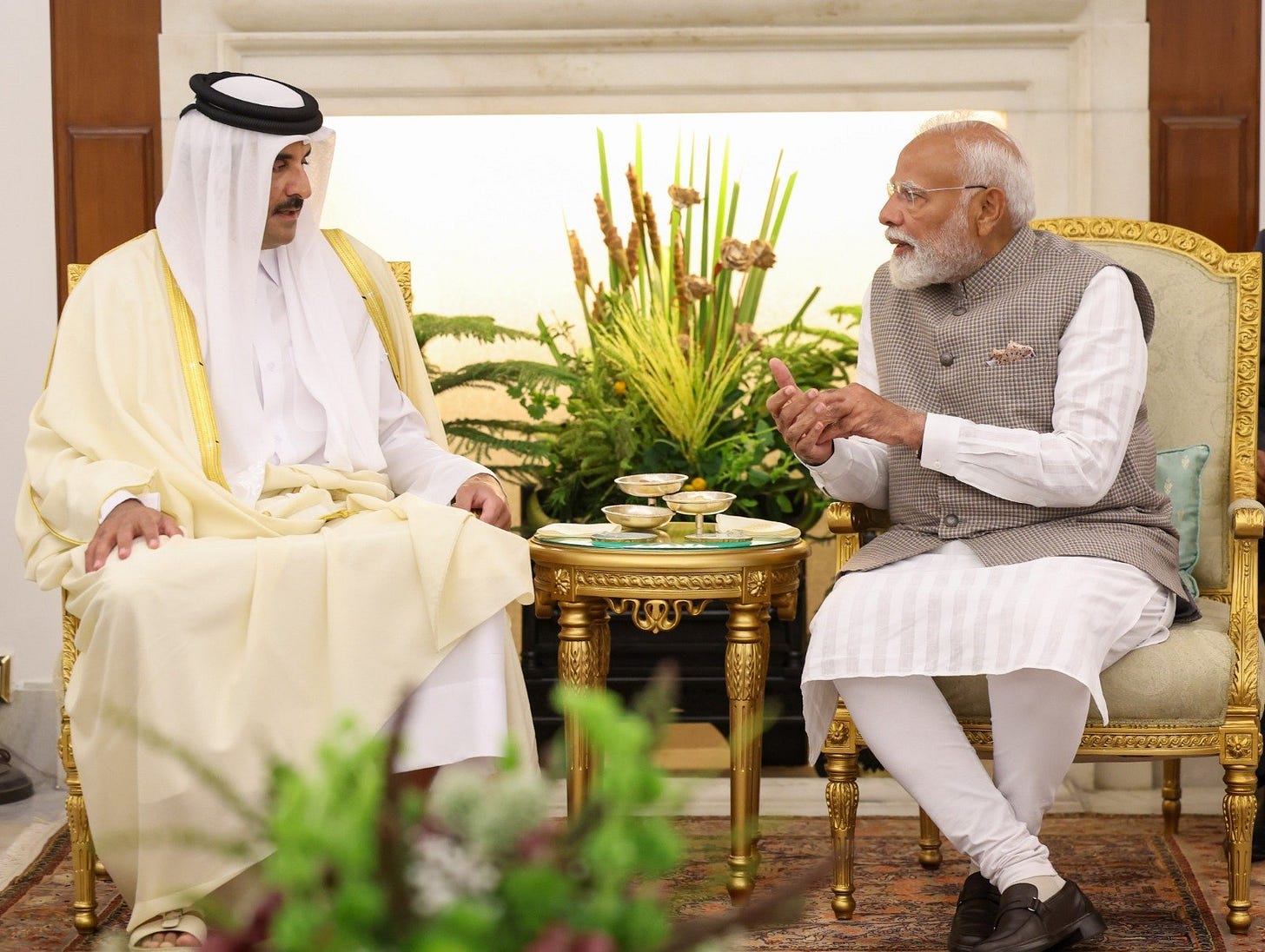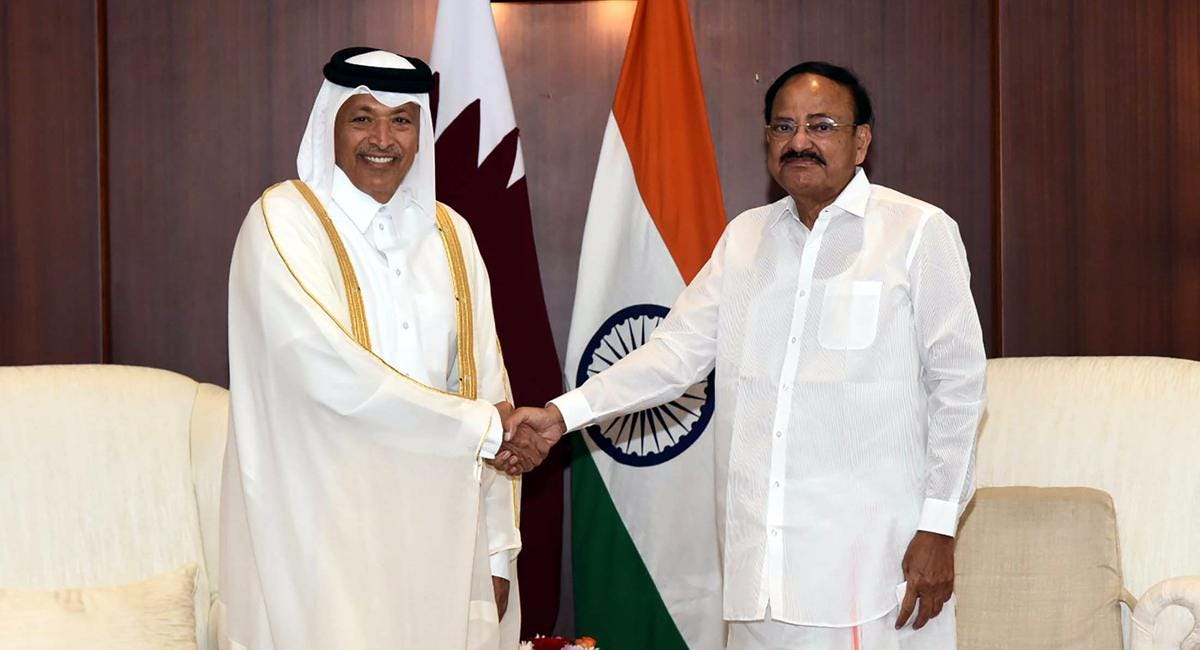India-Qatar Strategic Partnership: PM Modi’s Diplomatic Triumph in Resurrecting Sagging Bilateral Ties
Given that Indians constitute 25% of Qatar’s population, these efforts will reinforce social and economic integration between the two nations.
PM Modi’s Diplomatic Triumph in India-Qatar Strategic Partnership

Prime Minister Narendra Modi and Qatar’s Amir Sheikh Tamim Bin Hamad Al-Thani have ushered in a new era in India-Qatar relations, formally elevating ties to a strategic partnership during the Amir’s State visit to India on February 17–18, 2025. The breakthrough, anchored by a $10 billion Qatari investment pledge and a commitment to double bilateral trade to $28 billion by 2030, reflects deepening engagement in trade, energy, security, and technology.
However, this diplomatic milestone did not come without challenges. India-Qatar relations had touched a low point in June 2022, when Doha embarrassed then-Vice President M. Venkaiah Naidu during his visit (see footnote). Tensions escalated further in August 2024, when the Government of India’s Ministry of External Affairs (MEA) issued a disturbing statement regarding the status of Sri Guru Granth Sahib in Qatar, causing distress among Sikhs in India and worldwide.
A defining moment in bilateral ties came with the arrest and death penalty sentencing of eight Indian naval veterans in Qatar, triggering a diplomatic crisis. PM Modi personally intervened to resolve the issue, leading to the commutation of their death sentences and their eventual release. However, Commander Purnendu Tiwari remains under travel restrictions, and securing his full repatriation remains a key concern for India. PM Modi’s proactive diplomacy has been instrumental in restoring mutual trust and resurrecting the relationship, culminating in this landmark strategic partnership.
Strategic Partnership Agreement: A Framework for Future Collaboration
The Agreement on the Establishment of a Strategic Partnership institutionalizes a structured long-term mechanism for cooperation across key sectors. Qatar now joins the UAE, Saudi Arabia, Oman, and Kuwait as the fifth Gulf Cooperation Council (GCC) nation to establish a strategic partnership with India.
Economic and Trade Expansion
Bilateral trade, currently $14 billion annually, is set to double to $28 billion by 2030. The Joint Commission on Trade, co-chaired by commerce ministers, will replace the existing Joint Working Group on Trade, facilitating discussions on a potential Comprehensive Economic Partnership Agreement (CEPA).
Qatar’s $10 billion investment pledge, spearheaded by the Qatar Investment Authority (QIA), will focus on renewable energy, ports, and smart cities. To reinforce this commitment, QIA is opening an office in India, ensuring direct and sustained engagement.
Additionally, the revised Double Taxation Avoidance Agreement (DTAA) aims to streamline cross-border investments, preventing fiscal evasion. Qatar, which already has $30 billion invested in Indian equities and infrastructure, is expanding its financial footprint with Qatar National Bank (QNB) planning operations in Gujarat’s GIFT City.
Energy Security: Strengthening LNG and Renewables Partnership
India’s energy security remains a cornerstone of the partnership, with Qatar reaffirming its role as India’s largest supplier of liquefied natural gas (LNG). The 20-year LNG supply agreement, extended at preferential rates, ensures stability amid global energy volatility, particularly due to the Israel-Hamas conflict.
Beyond fossil fuels, discussions focused on joint initiatives in renewable energy, including green hydrogen, solar power, and smart grid integration, aligning with India’s net-zero goals.
Security and Counterterrorism: Enhancing Regional Stability
PM Modi and Amir Al-Thani strongly condemned cross-border terrorism, agreeing to enhance intelligence-sharing, cybersecurity efforts, and anti-money laundering measures. A new Working Group on Cybersecurity will counter online radicalization and cyber threats, a growing concern amid West Asian conflicts.
Qatar’s mediation in the Gaza ceasefire talks and India’s long-standing advocacy for a two-state solution underscored aligned diplomatic priorities. Significantly, PM Modi acknowledged Qatar’s role in securing the release of eight Indian naval veterans, whose sentencing had cast a shadow over relations. However, with Commander Purnendu Tiwari still under travel restrictions, the resolution of his case remains a diplomatic priority.
Technology and Digital Integration
In a major boost to financial technology collaboration, India’s Unified Payments Interface (UPI) has been operationalized in Qatar. QNB’s point-of-sale (POS) systems now accept UPI transactions, enhancing convenience for the 830,000-strong Indian diaspora in Qatar.
Both nations also explored joint ventures in artificial intelligence (AI), space technology, and startup incubators, leveraging Qatar’s $450 billion sovereign wealth fund and India’s digital innovation ecosystem.
Cultural and Diaspora Ties: Strengthening People-to-People Engagement
The launch of India-Qatar Year of Culture, Friendship, and Sports (2026) will include cultural exchanges, film festivals, and academic collaborations. Moreover, proposals for IIT and IIM campuses in Qatar were discussed, strengthening education and professional mobility for Indians.
Given that Indians constitute 25% of Qatar’s population, these efforts will reinforce social and economic integration.
Navigating West Asia’s Volatile Geopolitics
West Asian instability, particularly the Gaza conflict and rising U.S.-Iran tensions, shaped discussions. Both leaders advocated diplomatic dialogue over military escalation. Given Qatar’s dual role as a U.S. ally and a Hamas mediator, its engagement complements India’s balanced foreign policy approach.
Further discussions explored coordinated maritime security measures to counter Houthi attacks in the Red Sea, a major threat to global energy supply chains.
Challenges and Future Outlook
Despite this renewed partnership, some hurdles remain:
Pending Free Trade Agreement (FTA) Negotiations: India and the GCC are negotiating an FTA, but Qatar’s separate trade talks face complexities, especially in agriculture and pharmaceuticals.
Labor Rights and Visa Issues: Despite Qatar’s 2020 labour reforms, concerns persist over wage disparities and visa restrictions for low-skilled Indian workers.
Regional Instability: The Red Sea crisis and Iran-U.S. tensions continue to pose economic and energy security risks.
In Summary: A Diplomatic Masterstroke by PM Modi
The elevation of India-Qatar relations to a strategic partnership is a testament to PM Modi’s hands-on diplomacy, especially in reviving ties after a series of setbacks. From the 2022 diplomatic embarrassment to the Sikh religious controversy in 2024 and the Indian Navy veterans’ crisis, India-Qatar relations had deteriorated to a low point. It was left to PM Modi to personally intervene, ensuring the expeditious release of eight Indian naval officers and laying the groundwork for this strategic partnership.
Now more than a transactional alliance, the India-Qatar relationship is a forward-looking partnership that leverages Qatar’s financial muscle and India’s technological prowess to unlock $100 billion in potential trade and investment opportunities across the Indo-Pacific.
While challenges such as the Commander Purnendu Tiwari case and FTA negotiations remain, the diplomatic momentum created by PM Modi has firmly set India-Qatar relations on a path of resilience and growth.
As PM Modi aptly described, this relationship is now "steel-framed"—strong enough to withstand geopolitical turbulence while unlocking unprecedented economic opportunities. With mutual trust and strategic alignment, India and Qatar are set to emerge as stabilizing forces in an increasingly fractured global order.
Sri Guru Granth Sahib Incident in Qatar: The Sikh Sangat's Wake-Up Call
Sri Guru Granth Sahib Incident in Qatar








